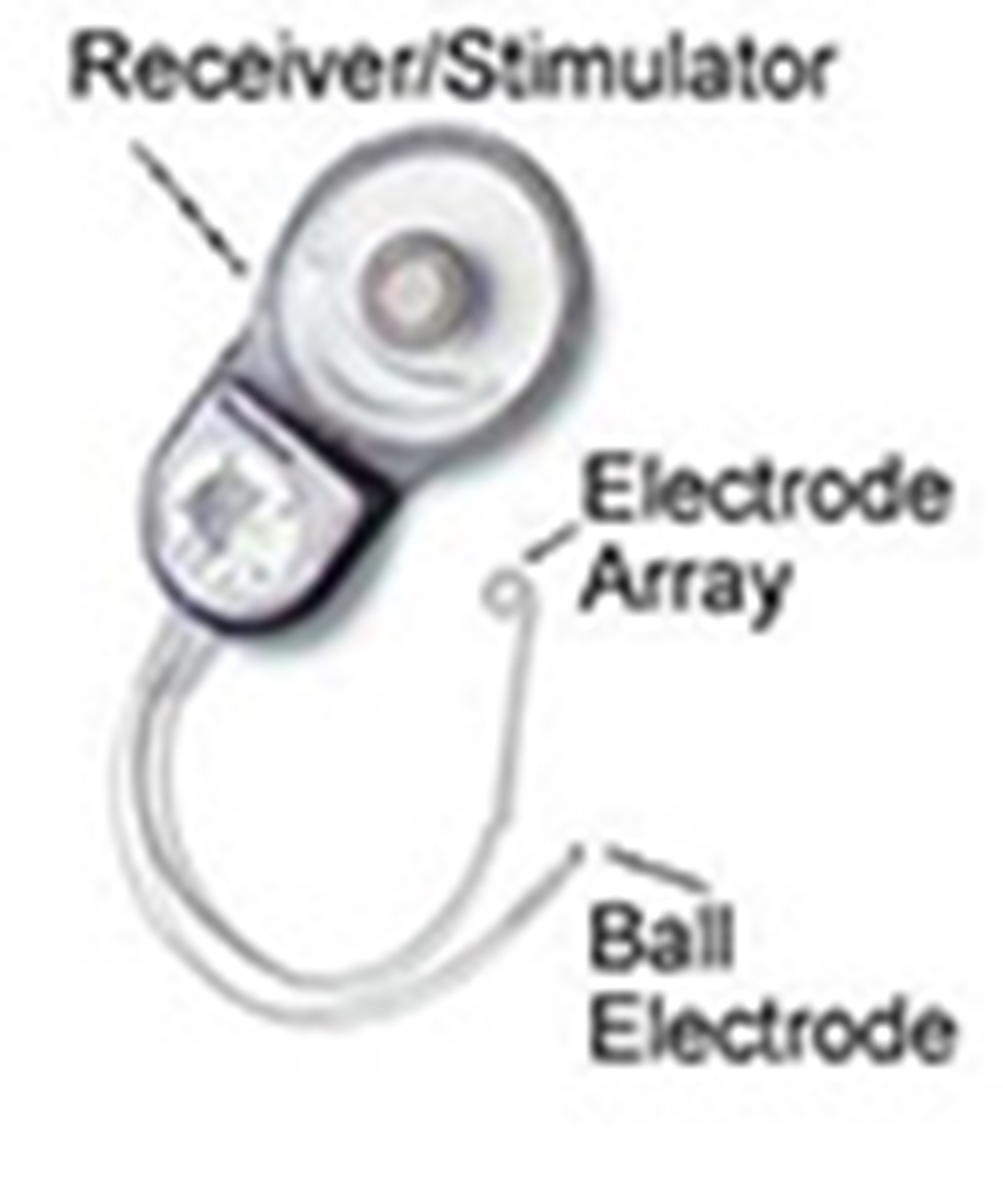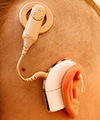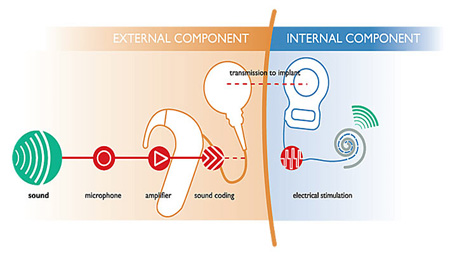Cochlear Implants


The cochlear implant (CI) program was created to serve children diagnosed with hearing loss who receive limited to no hearing aid benefit and whose families are dedicated to improving their child's communication mode.
Team members include a pediatric otolaryngologist, otologist/neurotologist, audiologists and speech-language pathologists with specialized training in the Auditory-Verbal Therapy approach. Other professionals may be added to your child's team if needed. These professionals may include physical therapy, occupational therapy or psychological services. We conduct monthly case conferences with CI physicians to discuss patients care.
 A cochlear implant has parts that are both inside and outside of the ear.
A cochlear implant has parts that are both inside and outside of the ear.
The inside part of the implant is a:
- Receiver with a magnet
- Wire attached to the receiver with small electrodes
The surgeon places the receiver under the skin, behind the ear. The receiver wire goes into the cochlea through an opening.
 The outside part of the implant has a:
The outside part of the implant has a:
- Processor that goes behind the ear
- Microphone that is in the processor
- Cable
- Coil
Can a cochlear implant help my child?
A cochlear implant can help children who:
- Receive limited benefit with hearing aids.
- Cannot hear speech and language with hearing aids.
- Are in good health for surgery.
- Have a family that understands the possibilities and problems with a cochlear implant.
- Have strong family support for therapy and practicing every day at home.
- Are around family members who consistently encourage listening and speaking.
- Go to schools and attend activities that have lots of opportunities for listening and speaking.
We do a full evaluation to find out if your child can have a cochlear implant. Some of these tests may include:
- Tests done in X-ray to see what the ear and brain look like (magnetic resonance imaging-MRI; computed tomography-CT).
- Tests to find out if there is a genetic cause for hearing loss.
- Checkups by the ear-nose-throat doctor (ENT or otolaryngologist).
- Visits with other doctors or specialists.

- Your child wears the sound processor (microphone) behind the ear or on the shirt.
- The microphone picks up sounds or speech.
- The processor changes this sound into a special code.
- The code travels up the cable to the coil and into the transmitter.
- The coil transmitter sends the code to the receiver magnet under the skin.
- This code then travels along the wire and through the cochlea.
- The wire sends the code directly to the auditory nerve.
- The auditory nerve sends the code to the brain.
Before and after getting a cochlear implant, your child will meet with members of the Cook Children's cochlear implant team, including:
- Pediatric otolaryngologist or neuro-otologist (ENT doctors who are highly skilled in surgery for children's cochlear implantation).
- Pediatric audiologists (specialists for hearing and hearing problems in children).
- Pediatric speech-language pathologists (specialists for speech and language problems in children).
- Listening and spoken language specialists (specialists in listening and speaking for children with hearing loss).
- Other professionals if needed (occupational therapists, physical therapists, social workers and psychologists).
Our audiologists:
- Are highly skilled, certified and have doctoral degrees.
- Have special training to work with children of all ages.
- Have many years of experience in testing children with hearing loss.
- Have advanced training to program cochlear implants for children.
What audiologists do:
- A full hearing evaluation to decide if a cochlear implant can help your child.
- Fit and program hearing aids before getting a cochlear implant.
- Teach you and your family about the different kinds of cochlear implants.
- Turn the cochlear implant on a few weeks after surgery.
- Program the cochlear implant when your child needs new information to hear.
- Test your child after the cochlear implant to see how much progress has been made.
Our speech-language pathologists and listening and spoken language specialists:
- Are highly skilled, certified and have master's degrees.
- Specialize in working with children of all ages.
- Have advanced training to work with children with cochlear implants.
- Have advanced certification in auditory-verbal therapy.
What speech-language pathologists do:
- A full speech and language evaluation before and after the cochlear implant.
- Visit with families about different ways children with hearing loss can communicate.
- Try out different plans for developing listening skills with the family and child before the cochlear implant.
- Continue therapy for listening and speaking skills after the cochlear implant.
- Provide families with information about schools and any other help your child may need.
- Talk with school teachers to explain the cochlear implant.
- Teach families about helping their child learn to listen and speak at home.
Your child's success begins with you.
- Make your home as quiet as possible so your voice is easy to hear.
- Talk to your child. Your voice and words will help the brain's hearing center develop.
- Sing to your child. Singing introduces rhythms and melodies. This helps develop the different tones in your child's voice.
- Read, read, read to your child. The number of words your child knows when entering kindergarten is the most important measure of school success. A typical 5-year-old uses about 2,500 words. A book is your child's best toy for exploring the world and the words that go with it.
- Get your child's attention first through sound. For example, call your child's name or start singing when you can't be seen. Watch for a reaction and then let them see you.
- Talk close to your child's ear at a normal speaking volume. This screens out some of the background noises so your voice is easier to hear. It's better to get closer than to get louder.
Pediatric aural rehabilitation services are provided by certified auditory-verbal therapists or speech-language pathologists, who have specific mentoring and training in auditory-verbal therapy strategies and techniques. These include:
Speech services:
- Pre and post cochlear implant evaluation
- Trial therapy before cochlear implant
- Auditory-verbal therapy
- Post cochlear implant rehabilitation
- Consultation about educational placement
- Coordination/collaboration with school personnel
Audiological services
- Comprehensive audiology evaluation
- Hearing aid testing and trial use
- Consultation regarding cochlear implant selection
- Cochlear implant device programming
- Cochlear implant device troubleshooting
Other medical services
A comprehensive medical assessment is a necessary part of the candidacy process. This assessment routinely consists of the following:
- Imaging tests (i.e., MRI, CT scan)
- Genetic assessment
- Otolaryngology evaluation
- Referral to other specialists as needed based on each child's needs
Physician referrals/consults
Physicians, make a referral or schedule consultation
Schedule an appointment
We're here to help.
If your child has been recommended to us, you probably have lots of questions. We can help. If you would like to schedule an appointment, refer a patient or speak to our staff, please call our offices at 682-885-4063.